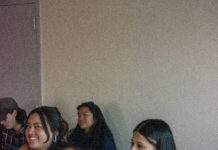The Criterion and the Associated Student Government (ASG) have been wrapped up in a feud for several months now, following a grievance filed by ASG Senator Richard Nguyen. Before the grievance, Criterion Editor in Chief Alec Williams had expressed a desire to separate from Student Life and run independently through revenue generated by advertisement sales.
On Sunday, several of The Criterion editors met with Student Body President Ben Linzey, intending to end the feud at last. The discussion mainly centered around Senator Nguyen’s actions last November.
“His anger toward The Criterion has been ongoing for quite some time,” News Editor Chris DeLeon told Linzey. “Since our very first issue this year that said, ‘CMU is boring,’ he’s been stewing and steaming and getting more and more upset every time there was any critical article written about ASG.”
The grievance Nguyen filed specifically referenced an article about a Sodexo employee threatening a woman with sexual assault.
“The biggest thing is that [Richard] chose to do what he wanted to do,” Linzey said in response to questions about Nguyen’s actions.
The Criterion editors expressed concern that Nguyen got away with his actions without ASG stepping up to defend their freedom of speech. According to the editors, when he filed the grievance, he threatened the budget of The Criterion, an action that sets a precedent for budget cuts to other student organizations.
“First and foremost, Richard’s allowed to feel however he wants to feel. He’s allowed to have that opinion,” Linzey said regarding Nguyen’s anger toward The Criterion.
Williams disagreed with Linzey, arguing that Nguyen should have expressed his opinion through a different avenue.
“If he was voicing his opinion, he would have written a letter to the editor,” Williams said. “He would have talked to any of us personally, but instead, he took a measure that encourages someone to lose their job. That’s what a grievance is. That’s his intent.”
Photo Editor Casey Smith was concerned about another aspect of Nguyen’s actions.
“I don’t think that it’s necessarily the filing of the grievance that we’re most concerned with, necessarily,” Smith said. “It’s the fact that he was able to get into this office where he wasn’t supposed to be and tape the Code of Ethics to our door before the grievance was even filed. That was a threatening action.”
Back in November, Williams expressed the desire to separate from Student Life and ASG so that The Criterion could become its own business without ASG determining the budget from year to year. During this meeting, the subject was discussed again.
Williams has mentioned in the past that separating from ASG would give The Criterion a new level of freedom.
“If The New York Times’s entire budget was decided by interest groups and the U.S. government, do you think they would write as freely and as honestly as they do?” Williams asked.
He made the analogy that since The Criterion’s budget is determined by senators of ASG, one of whom is Richard Nguyen, the newspaper’s budget could be in potential danger every time an ASG senator is offended by something in an article.
“The main thought process at this point is that it definitely needs to happen but it’s not going to happen this semester,” Williams said regarding the newspaper’s departure from Student Life.
Linzey disagreed and was confident that the separation wasn’t necessary.
“I just think there’s a lot more better options,” Linzey said.
DeLeon agreed with Williams and argued Nguyen’s actions provide clear evidence as to why The Criterion needs to separate.
If you guys [ASG] had protected our budget, if you guys had forced some accountability for actions, then I could see why you’d say, ‘There’s no reason for you guys to want to leave Student Life.’”
According to DeLeon, since ASG did not pursue anything other than an investigation, which turned up no wrongdoing, into Nguyen’s actions, they lost their right to say whether or not The Criterion should separate from Student Life.
As the meeting wrapped up in a little under an hour, Linzey and the editors discussed ways the two groups can better communicate during this semester and avoid another incident such as last November’s.





